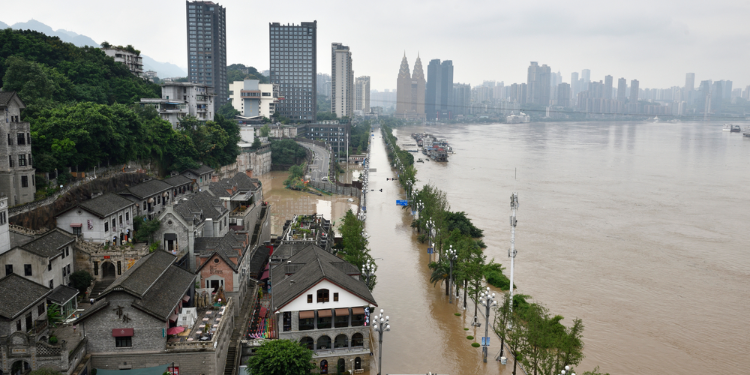
Every year, many websites rank the most attractive expat destinations, taking into account factors like economic dynamism, quality of life, the healthcare system, etc. The climate is one thing that people often fail to consider before moving abroad. Will the latest natural disasters be a game-changer?
The impact of natural disasters on popular expat destinations
Taiwan, Australia and Canada are in the top 10 of the best countries for expats in 2021 thanks to their economic attractiveness, career prospects, quality of life. These countries were already very popular with expat before the Covid-19 pandemic. However, these countries are facing unprecedented natural disasters lately.
Canada is now facing terrible fires following an extreme heatwave in July, with temperatures locally exceeding 50 °C. In Australia, fires led to more than 30 deaths in 2019 and 2020. Nearly three-quarters of the population were affected directly or indirectly affected, more than a billion animals were killed, and more than 10 million hectares of land were ravaged. The country is still suffering from this tragedy, and expatriates in Australia have not been spared either. Scientists unanimously that the violent fires and the intensity of the heatwave in Australia are a result of global warming. The situation is equally alarming in Canada, the United States, Russia, India, Spain, Pakistan, and the Maghreb region, where global warming has led to extreme heatwaves.
However, climate doesn't seem to be a priority for people planning an international relocation. Still, many expats have shown concern for this issue over the past few years, especially travellers. According to the French Ministry of Ecological Transition, in 2018, transport represented a quarter of CO2 emissions globally (the majority of emissions - 41% - come from electricity). Air travel accounts for around 3% of CO2 emissions, according to the French Ecological Transition Agency. But for the more pessimistic Climate Action Network, air travel accounts for 5% of CO2 emissions.
Still, road transport remains the most polluting. So like locals, expatriates and frequent travellers have to assess their lifestyle and travel habits, considering the number of tragedies the planet has been facing recently. It's okay to travel, but it is important to consider where to travel and how.
Major natural disasters
In January 2020, two islands in Sumatra, an Indonesian province, were submerged by water. Four others are threatened, including Salah Namo, an inhabited island. Global warming and human activity are deemed to be the main reasons behind this natural disaster. The same goes for Kenya, where the rising waters of Lake Baringo (February 2021) are threatening an entire ecosystem. All over the world, and in recent years, populations have been displaced, and climate refugees have increased in number. In Venice, scientists are worried that tourists see only the illusory beauty of the moment. Last June, the famous Saint Mark's Square was flooded during the high tide called “acqua alta”, but this phenomenon does not usually happen in summer. So it's clear, for researchers, that climate change has now become an emergency.
Rising water levels, loss of territory, fires, etc., lead to accumulating human and financial losses. Climate survivors do not really recover from these tragedies. Sometimes, they become refugees in their own country and directly suffer the consequences of global warming. Europe has not been spared either. Recently, deadly floods were reported in Germany, Belgium and northeastern France.
China and India are also suffering from floods. China's northeastern Henan province (home to Zhengzhou, the prefecture-level city) recently experienced one of its deadliest floods. The official death toll is 51, but it is suspected that it made many more victims. India is going through a tough period with cyclones, heatwaves, the detachment of a glacier in the Himalayas (with at least 18 deaths and 200 people reported missing), floods, landslides (at least 127 people were reported dead last Thursday). All these natural disasters result from global warming, which is something that expats and expats-to-be definitely need to consider as their scale and frequency increase.
A new challenge to international relocation
Are these natural disasters likely to have an impact on international relocation? Over the years, this is an issue that researchers have been debating. Usually, people chose to move abroad in search of a life, to fulfil a dream, and hoping for better days. But can you really expect a change when you're directly or indirectly contributing to these natural disasters?
Southeast Asian countries like Taiwan, Singapore, Malaysia and Thailand, and East Asia (South Korea, Japan) often rank among the most popular expat destinations. Taiwan, for example, is an attractive country, which is, however, regularly hit by earthquakes. Most people tend to link Japan with earthquakes, forgetting that Taiwan is also in an active seismic zone. The last earthquake, of magnitude 6.2, hit the island in December 2020. In 2019, at least two large earthquakes of magnitude 6.1 (April) and 5.9 (August) were reported in Taiwan. Officially, ten people were injured (April earthquake), one person died (August earthquake), and some 10,000 homes were deprived of electricity, not to mention other material damage. A similar scenario occurred in February and October 2018, with two earthquakes causing the death of 17 people (February). However, Japan is one of the rare countries that have been able to preserve their economy, even during the pandemic. Despite a peak in 2020, the way it dealt with the global health crisis is being praised worldwide. The recent surge only boosted the COVID-19 vaccination campaign, which looks quite reassuring to the local and international populations.
Do the natural disasters that have occurred in these countries, and, more broadly, scientific alerts, influence expat choices? Over the years, people are becoming increasingly aware of the dangers of climate change, even though actions are still awaited. The Covid-19 crisis seems to have slowed down political ambitions, given the economic urgency. But expatriates, especially those who travel a lot, have a crucial role to play since they also impact their immediate environment.
Often, when we speak of climate, natural disasters eventually come to our minds, and we fail to consider their importance in our everyday lives. However, climate change does have a significant impact on international relocation. In Japan, for example, the summers are hot and humid. In Tokyo, the air quickly becomes suffocating, even more for expats and their families, who are less used to this kind of environment than the Japanese. Hot summers, harsh winters, low light, frequent rainfall, etc., can affect the mood of an expat, so think twice before moving. Things can turn out worse for expat dependents who often don't have the choice, so they tend to find it harder to adapt to their new environment.
According to many reports, people are becoming increasingly aware of their own impact on the environment. Some are already changing their travel plans for less polluting transportation options, even if it takes longer. Others are choosing to videoconference rather than long business trips since the beginning of the Covid-19 crisis. However, the environmental impact of digital pollution has not yet been fully measured. Still, others continue to fly, although the world is showing more concern through "green" projects for all tastes.
Expats will have several alternatives to adapt their project. Every day, climate change shows in a tragic way how it can reshape humanity.



















